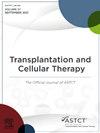Awakening from REMS: ASTCT 80/20 Ongoing Recommendations for Safe Use of Chimeric Antigen Receptor T Cells
IF 3.6
3区 医学
Q2 HEMATOLOGY
引用次数: 0
Abstract
The first 6 chimeric antigen receptor T cell (CAR-T) therapies approved in the United States have Risk Evaluation Mitigation Strategies (REMS) programs mandated by the US Food and Drug Administration (FDA). REMS programs aim to ensure the safe use of CAR-T therapy through timely recognition and management of unique severe risks and toxicities that cannot be mitigated by labeling alone, such as cytokine release syndrome and neurotoxicity syndromes. At the launch of each of the first 6 products, CAR-T REMS programs mandated product-specific education and training for clinical staff, patients, and caregivers; adequate access to medications to treat expected toxicities; and reporting of toxicities either to the product manufacturer or to the FDA. Each manufacturer ensures that treatment centers comply with the REMS program for their individual product in different ways, involving time-consuming and often redundant training, testing, and audits. The American Society for Transplantation and Cellular Therapy (ASTCT) 80/20 Subcommittee convened its second workshop in June 2023, inviting approximately 70 cellular therapy stakeholders to discuss whether safety and quality workflows embedded in existing resources within the cellular therapy field could replace FDA-mandated and company-monitored REMS programs. Attendees were clinicians at large academic medical centers experienced in cellular therapy, regulators, members of accrediting bodies and professional societies, and manufacturers of immune effector cell (IEC) therapies at multiple stages of development. Discussion centered on (1) educational requirements for safe delivery and management, (2) goals and mechanisms for data reporting and to whom, and (3) what entities should oversee these quality safeguards around CAR-T administration and management. Broad support was voiced for (1) conducting training programs administered by treatment centers and/or professional societies to replace manufacturers’ product training; (2) reporting standardized data points into a central, accessible repository for tracking of safety trends and identification of new signals; and (3) enabling accrediting bodies to attest to programs’ quality and ongoing compliance with field safety expectations, thereby replacing intensive manufacturer initial evaluation and ongoing REMS audits. The strong consensus of the second multidisciplinary ASTCT 80/20 Workshop was that such measures would allow elimination, or at least significant reduction and simplification, of current CAR-T REMS programs. Development of educational resources and funding for data reporting outside of a mandated REMS structure were identified as critical, particularly to support treatment centers new to cellular therapy, as were ongoing collaborations with FDA and manufacturers. These consensus recommendations were shared with the FDA at the Cell Therapy Liaison Meeting and in multiple professional society meetings and other public forums with regulators, manufacturers, and FDA representatives. Recently the FDA scaled back several of the features of existing CAR-T REMS programs redundant to standard clinical practice, specifically requirements related to manufacturer-created training, product-specific testing of trained staff, and data reporting to manufacturers. The seventh commercial CAR-T product (Aucatzyl, or obecabtagene autoleucel) was the first approved without a REMS program as of November 8, 2024. Continued streamlining of already widespread CAR-T safety standards for existing and future approved CAR-T cells and other unique cellular therapy products and ensuring their adoption at new and existing treatment centers will be required to maintain and increase access to the ever-growing number of effective adoptive cellular therapies.
从REMS中觉醒:ASTCT 80/20关于嵌合抗原受体T细胞安全使用的持续建议。
美国批准的前六种嵌合抗原受体T细胞(CAR-T)疗法具有由食品和药物管理局(FDA)授权的风险评估缓解策略(REMS)计划。REMS项目旨在通过及时识别和管理无法通过单独标记减轻的独特严重风险和毒性,如细胞因子释放综合征和神经毒性综合征,确保CAR-T细胞的安全使用。在每个产品发布时,CAR-T REMS项目都要求对临床工作人员、患者和护理人员进行特定产品的教育和培训;充分获得治疗预期毒性的药物;并向产品制造商或FDA报告毒性。每个制造商都确保治疗中心以不同的方式遵守各自产品的REMS程序,包括耗时且经常冗余的培训、测试和审核。美国移植和细胞治疗学会(ASTCT) 80/20小组委员会于2023年6月召开了第二次研讨会,邀请了大约70名细胞治疗利益相关者讨论嵌入细胞治疗领域现有资源的安全和质量工作流程是否可以取代fda授权和公司监测的REMS项目。与会者包括在细胞治疗方面经验丰富的大型学术医疗中心的临床医生、监管机构、认证机构和专业协会的成员,以及处于多个发展阶段的免疫效应细胞(IEC)疗法的制造商。讨论集中在1)安全交付和管理的教育要求,2)数据报告的目标和机制以及向谁报告,以及3)哪些实体应该监督CAR-T行政和管理方面的质量保障。1)由治疗中心和/或专业协会管理的培训计划,以取代制造商的产品培训;2)将标准化数据点报告到一个中央的、可访问的存储库中,以跟踪安全趋势和识别新的信号;3)使认证机构能够证明计划的质量和持续符合现场安全期望。从而取代密集的制造商初始评估和正在进行的REMS审核。第二届多学科ASTCT 80/20研讨会的强烈共识是,这些措施将允许消除或至少显着减少和简化当前的CAR-T REMS计划。在强制性REMS结构之外,教育资源的发展和数据报告的资助被认为是至关重要的,特别是支持细胞治疗的新治疗中心,以及与FDA和制造商的持续合作。这些共识建议在细胞治疗联络会议、多个专业协会会议和其他与监管机构、制造商和FDA代表的公共论坛上与FDA分享。最近,FDA缩减了现有CAR-T REMS项目的一些多余的标准临床实践的特征,特别是与制造商创建的培训,培训人员的产品特定测试以及向制造商报告数据相关的要求。截至2024年11月8日,第7个商业化CAR-T产品(Aucatzyl®或obbecabtagene autoeucel)是第一个未经REMS程序批准的产品。对于现有和未来批准的CAR-T和其他独特的细胞治疗产品,需要继续简化已经广泛存在的CAR-T安全标准,并确保它们在新的和现有的治疗中心得到采用,以保持和增加对数量不断增长的有效过继细胞疗法的使用。
本文章由计算机程序翻译,如有差异,请以英文原文为准。
求助全文
约1分钟内获得全文
求助全文
来源期刊

Transplantation and Cellular Therapy
Medicine-Hematology
CiteScore
7.00
自引率
15.60%
发文量
1061
审稿时长
51 days
 求助内容:
求助内容: 应助结果提醒方式:
应助结果提醒方式:


